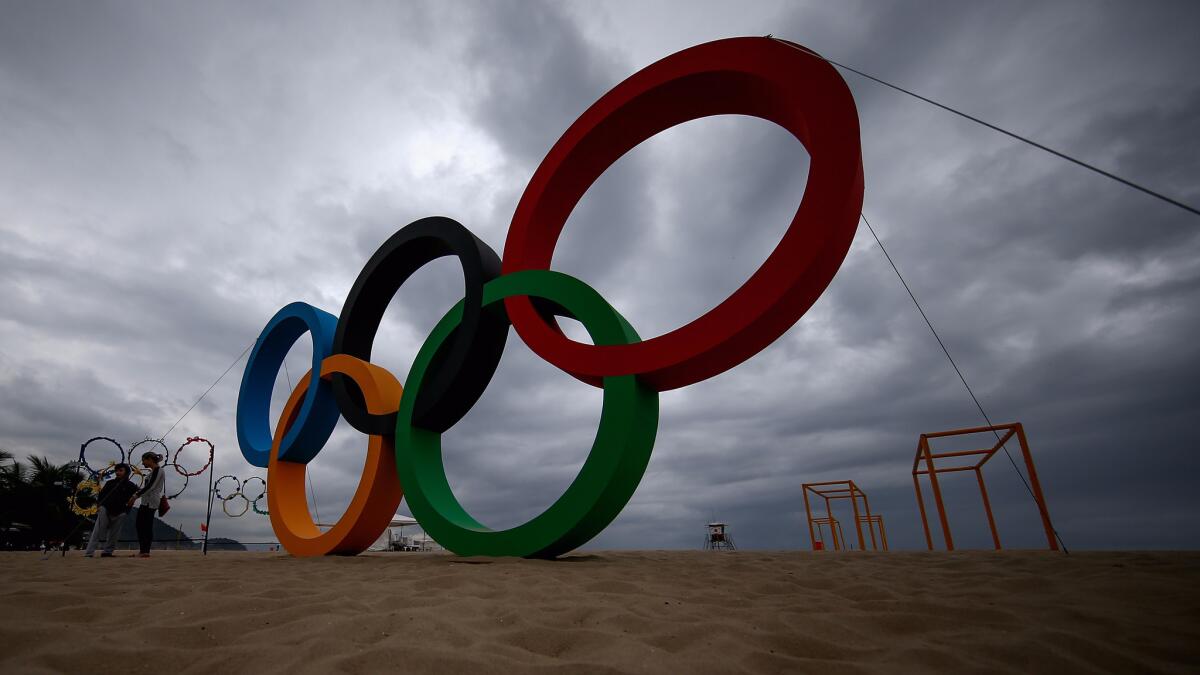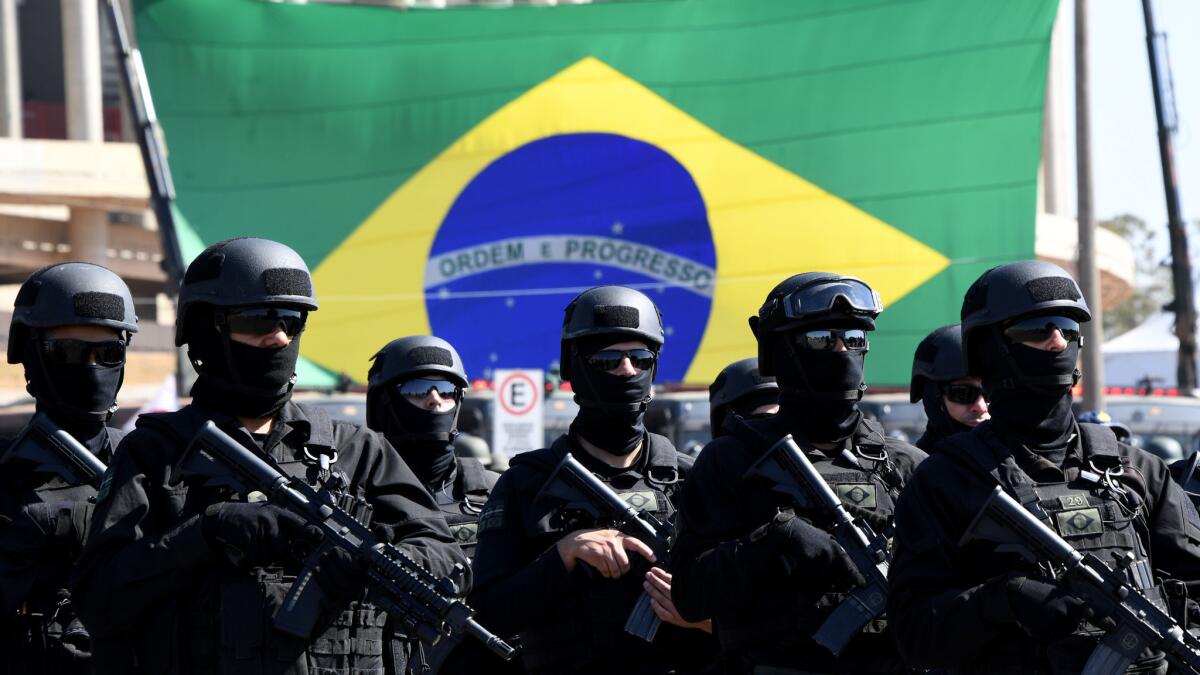The Olympics are coming, but Brazil, beset by troubles and gloom, yawns

- Share via
Reporting from Rio de Janeiro — For a full year before the 2014 World Cup, a fierce debate raged throughout the host nation of Brazil.
Thousands periodically protested the Cup, some predicting chaos or demanding better government services. Others aggressively defended the choice to play host and said Brazil would impress the world with its organization.
Sports fans endlessly analyzed the team itself, speculating on Brazil’s chances at winning, or painted their neighborhoods yellow and green to support the players.
The opening ceremony for Rio 2016 is now less than two weeks away, but the country hardly feels seized by the Olympic spirit. The Games haven’t dominated the national conversation. Ticket sales have been slow. The dominating sentiment seems neither strong support nor dedicated opposition, but rather general indifference.
Even on Copacabana beach, Rio’s main tourist neighborhood, signs of the upcoming Games do not jump out at visitors, and life goes on mostly as normal, said Jenoval Ferreria da Lima Neto, 38, who operates one of the many businesses there catering to tourists on the boardwalk. He charges for photos of an enormous sandcastle that says, “Welcome to this marvelous city.”
“We thought about adding something [to the sand sculpture] about Rio 2016, but, nah, why?” he said as construction workers assembled stands behind him for the Olympic beach volleyball events. “For those of us who work with tourists, we’re looking forward to making more money, because times are rough, but I don’t feel like the nation is united for this.”
He noted the problems locals face in healthcare, security and education. The protests before and during the World Cup called for improvements in those areas, “but they didn’t lead to anything better,” he said. “It was just a big ruckus that faded away.”
A recent poll performed by the respected Datafolha agency said that 51% of Brazilians surveyed had “no interest” in the Games, and 33% said they had “a little interest.” Moreover, 63% of Brazilians say the Games will bring “more harm than benefit.” These numbers have worsened since a similar poll in 2013, when only 40% thought harm would outweigh benefit, and only 28% reported having “no interest.”
Local experts and residents have a few explanations for the apparent Olympic apathy, the most obvious is that Brazilians have always preferred soccer. But a lot has also changed for the worse since Rio won the Games in 2009, and they say that many Brazilians are more concerned with other issues, such as a crippling recession and an ongoing political crisis. Months of protests culminated in May with the suspension of elected President Dilma Rousseff, who now faces an upcoming impeachment trial.

“Brazil is simply tired, it’s like we have a national hangover after everything that happened recently in the country. It was much more tumult than we are used to. People are demobilized, even on social media,” says Maurício Santoro, a political scientist at Rio de Janeiro State University. “Thanks to economic and political crisis, this is not a time for national pride. It’s like if you were ready to clean up your house and do some much-needed renovations, and all of a sudden you have all these guests who might see something you’d rather hide.”
Some commentators have noted that host cities often experience a lack of enthusiasm before an Olympiad —and that the mood soon picks up once the games begin. The opening ceremony is on Aug. 5.
Santoro said that he believes the city will improve its mood once the Games begin, and that some political groups may take advantage of the spotlight to make their case.
It’s still not clear who will open the Games, whether interim President Michel Temer or some other government representative; the Senate impeachment trial which could permanently remove Rousseff won’t end until after the Olympics. Many world leaders will reportedly stay away from the opening ceremony in order to avoid the awkward question of whether they should embrace Temer or Rousseff, the formerly popular left-wing president who accuses her former vice president of plotting a coup.
There has been lower than expected demand by Brazilians for the events, and foreigners can now buy tickets at prices previously only available to locals. The lack of demand doesn’t surprise Irnaldo Silva, 28, who works as a doorman at a Rio apartment building.
“I can’t afford tickets, and I can’t go to those Games anyway. I have to work all day. I guess I’ll watch it on TV,” Silva said. He added that demand for the rental rooms in his buildings that usually go to Brazilian tourists has been lower than expected. “We just haven’t felt the excitement,” Silva said.
See more of our top stories on Facebook »
Local television has slowly begun to build up excitement for the Games, focusing on unknown sports and potential Brazilian Olympic stars. But most of the coverage has focused on transportation headaches or concerns that the country may have to deal with the threat of terrorism for the first time in memory.
On Thursday the government announced it had arrested 10 people in the early stages of discussing forming a terror cell, but they were described as “amateurs” without any concrete plans.
In a recent interview with the Los Angeles Times, Rio Mayor Eduardo Paes celebrated the fact that the Olympic Games had not become a national controversy like the 2014 World Cup.
“Remember in the World Cup?” he said. “You had protests saying, ‘There’s not going to be a World Cup.’ You’re not hearing a protest saying, ‘There will be no Olympics.’ But are they excited? Excited is another story. Brazilians aren’t excited about anything.”
Bevins is a special correspondent.
ALSO
When it comes to raising a child disabled by Zika, Brazilian women often do it alone
Brazilian police arrest 10 suspected of planning for terrorist attack around Olympics
Police greet visitors to Rio with signs saying ‘Welcome to hell’
More to Read
Sign up for Essential California
The most important California stories and recommendations in your inbox every morning.
You may occasionally receive promotional content from the Los Angeles Times.










